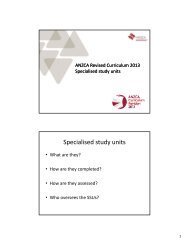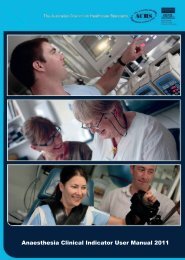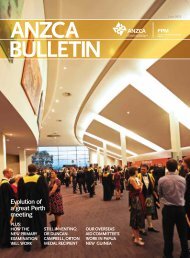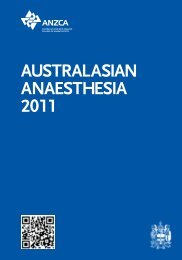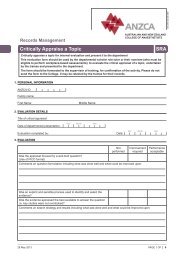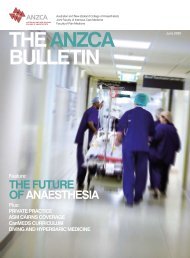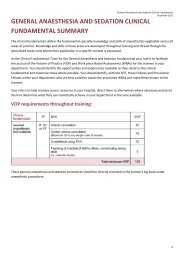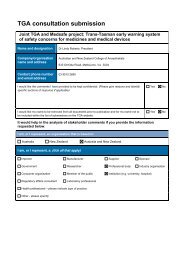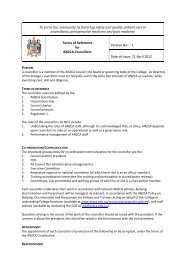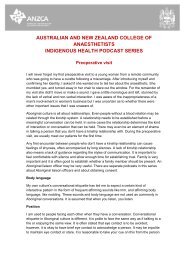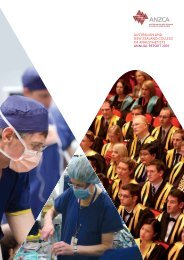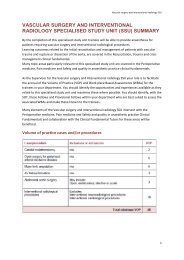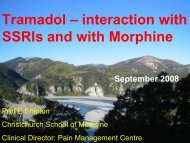ANZCA Bulletin June 2011 - Australian and New Zealand College of ...
ANZCA Bulletin June 2011 - Australian and New Zealand College of ...
ANZCA Bulletin June 2011 - Australian and New Zealand College of ...
Create successful ePaper yourself
Turn your PDF publications into a flip-book with our unique Google optimized e-Paper software.
Assessing the<br />
effectiveness<br />
<strong>of</strong> training<br />
In recent years, the Anaesthesia<br />
<strong>and</strong> Pain Medicine Foundation has<br />
awarded several research grants<br />
to Associate Pr<strong>of</strong>essor Jennifer<br />
Weller, MBBS, MClinEd, MD, FRCA,<br />
F<strong>ANZCA</strong>, above, who is the head <strong>of</strong><br />
the Centre for Medical <strong>and</strong> Health<br />
Sciences Education at the University<br />
<strong>of</strong> Auckl<strong>and</strong>. The grants are assisting<br />
research essentially into the effects<br />
<strong>and</strong> effectiveness <strong>of</strong> training. The<br />
projects awarded grants are:<br />
2009: A simulation grant <strong>of</strong> $34,812<br />
for research entitled, “Validity <strong>of</strong><br />
performance in the anaesthesia<br />
patient simulator as a measure <strong>of</strong><br />
performance in the operating room”.<br />
<strong>2011</strong>: A project grant <strong>of</strong> $50,000 for<br />
research entitled, “The effectiveness<br />
<strong>of</strong> video-based training to improve<br />
teamwork behaviours in acute care:<br />
a r<strong>and</strong>omised controlled trial”.<br />
<strong>2011</strong>: A simulation grant <strong>of</strong> $22,800<br />
for research entitled, “The impact <strong>of</strong><br />
assessment on life <strong>and</strong> learning”.<br />
Here, Associate Pr<strong>of</strong>essor Weller<br />
reports on her research.<br />
The project, “Validity <strong>of</strong> performance<br />
in the anaesthesia patient simulator<br />
as a measure <strong>of</strong> performance in the<br />
operating room,” compares individual<br />
anaesthetists’ teamwork behaviours in<br />
clinical settings with their behaviours<br />
in routine <strong>and</strong> crisis simulations.<br />
We want to answer two questions: do<br />
anaesthetists behave in the same way in<br />
the simulated environment as they do in<br />
the clinical setting; <strong>and</strong> does behaviour<br />
in routine cases predict behaviour in a<br />
clinical crisis This has implications for<br />
using simulated environments to learn<br />
teamwork skills <strong>and</strong>, furthermore, may<br />
suggest the need to assess response to<br />
crises in a simulator.<br />
Our surgical colleagues have produced<br />
a considerable amount <strong>of</strong> evidence<br />
to support the validity <strong>of</strong> surgical<br />
procedural simulators but with the<br />
more complex integrated anaesthesia<br />
simulators, this evidence is harder to<br />
produce, although there is some support<br />
for the validity <strong>of</strong> anaesthesia simulations<br />
based on activity patterns. 1<br />
In this study, we have videotaped 17<br />
anaesthetists <strong>and</strong> anaesthetic assistants<br />
in three settings: (1) an operating room<br />
during a routine list; (2) a simulation<br />
modelled on typical cases; <strong>and</strong> (3) a<br />
simulated case with an intraoperative<br />
crisis.<br />
We have developed <strong>and</strong> validated a<br />
coding framework to analyse interactions<br />
between anaesthetists <strong>and</strong> the operating<br />
room team <strong>and</strong> have now completed all<br />
the coding – the analysis <strong>of</strong> our very<br />
large data set has just begun <strong>and</strong> we look<br />
forward to seeing what patterns emerge.<br />
From participants’ perspective,<br />
they considered their behaviours in the<br />
simulator as realistic or very realistic, <strong>and</strong><br />
scored specific teamwork behaviours as<br />
occurring at a similar frequency in the<br />
simulations <strong>and</strong> the operating room.<br />
We are now planning to rate all the<br />
simulations again, this time using a<br />
teamwork behavioural rater our group<br />
developed <strong>and</strong> validated in a previous<br />
<strong>ANZCA</strong>-funded grant. 2 We have managed<br />
to find a willing group <strong>of</strong> assessors <strong>and</strong><br />
have the assessor training day arranged.<br />
This will be no small task for them but<br />
they should be able to tell us, among<br />
other things, if behaviour in routine cases<br />
predicts behaviour in a clinical crisis.<br />
Previous work from our group has<br />
focused on the development <strong>of</strong> robust<br />
instruments to measure teamwork<br />
behaviours, 3-5 in order, first, to see if we<br />
can assess performance, <strong>and</strong> secondly to<br />
see if interventions to improve teamwork<br />
are effective. We have shown improved<br />
teamwork in intensive care unit (ICU)<br />
teams following simulation training, <strong>and</strong><br />
even identified improvements in specific<br />
components <strong>of</strong> teamwork. 6<br />
Following on from this work, our next<br />
project is to assess “The effectiveness<br />
<strong>of</strong> video-based training to improve<br />
teamwork behaviours in acute care:<br />
a r<strong>and</strong>omised controlled trial”. Here<br />
we want to drill down to very specific<br />
behaviours associated with improved<br />
teamwork, <strong>and</strong> see if we can teach these<br />
using videos role-modelling desirable<br />
models <strong>of</strong> communication.<br />
54<br />
<strong>ANZCA</strong> <strong>Bulletin</strong> <strong>June</strong> <strong>2011</strong>




